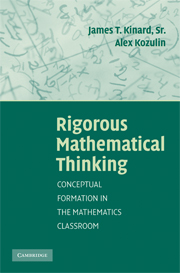Book contents
- Frontmatter
- Contents
- Introduction
- 1 Culture of Mathematics
- 2 Goals and Objectives of Mathematics Education
- 3 Vygotsky's Sociocultural Theory and Mathematics Learning
- 4 Mediated Learning and Cognitive Functions
- 5 Mathematical Concept Formation and Cognitive Tools
- 6 RMT Application, Assessment, and Evaluation
- Conclusion
- References
- Index
1 - Culture of Mathematics
Published online by Cambridge University Press: 05 June 2012
- Frontmatter
- Contents
- Introduction
- 1 Culture of Mathematics
- 2 Goals and Objectives of Mathematics Education
- 3 Vygotsky's Sociocultural Theory and Mathematics Learning
- 4 Mediated Learning and Cognitive Functions
- 5 Mathematical Concept Formation and Cognitive Tools
- 6 RMT Application, Assessment, and Evaluation
- Conclusion
- References
- Index
Summary
Sociocultural Needs Systems
The culture of mathematics has emerged from sociocultural needs systems over centuries. A needs system is a set of internalized habits, orientations, and predispositions that work together to provide the “blueprints” for human actions and the meanings for developing know-how. Sociocultural needs systems are integrally and functionally bound to the life and “ways of living” of the human society. They include both affective and cognitive-operational dimensions. These needs systems are engendered and shaped by a complexity of environmental, social, and cultural factors. The formation of such systems evolves into structures of meaning that carry the imprint of the society.
Different societies and different individuals may have different habits, orientations, and predispositions, and yet we are not aware of any human group that does not have some of the following needs systems: spatial and temporal orientation; identification of structure and function; part and whole relationships; change, constancy, and steady states; order, organization, and systems; balance, continuity, and symmetry; abstraction; and need for rigor. These needs systems reflect the objective circumstances of human existence, they are represented in human cognition, and they constitute the basis of mathematical knowledge.
One can approach these systems from three different perspectives: (1) the cultural-historical perspective, reflecting the developing needs of a given society; (2) the individual perspective, reflecting human genetic and biological predispositions on the one hand and individual appropriation of sociocultural tools on the other; and (3) the perspective of mathematical culture whereby these need systems were transformed into specific systems of mathematical meanings and operations.
- Type
- Chapter
- Information
- Rigorous Mathematical ThinkingConceptual Formation in the Mathematics Classroom, pp. 16 - 34Publisher: Cambridge University PressPrint publication year: 2008



